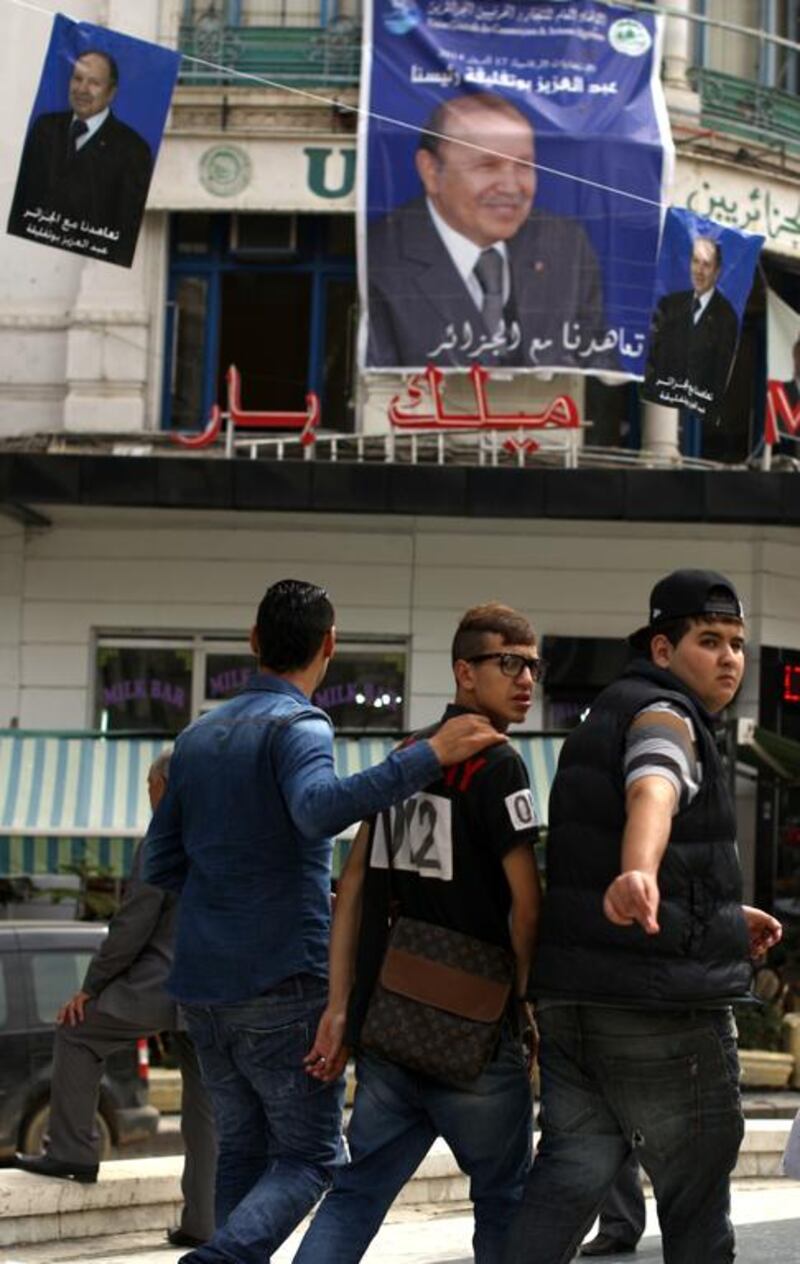BLIDA, Algeria // The young man in the internet cafe declined to give his name, but had no problem giving his views about the recent re-election of ailing 77-year-old President Abdelaziz Bouteflika.
“These days you’re not going to end up in prison for what you say,” said the 24-year-old. “But the problem is, the corrupt people aren’t going to prison either!”
His views on Mr Bouteflika's fourth term were similar to many of his generation, who in these elections, as in the legislative elections of 2012, were notably absent from the voting booths.
“Maybe Bouteflika has created work for some young people, but it all goes to those who have connections, through corruption,” said the young man, who did not have a job. A January 2014 report from the International Monetary Fund said that overall unemployment eased last year to 9.8 per cent though it remained high “among youth and women”.
Blida, a quiet provincial town twenty-six miles south of Algiers and surrounded by good agricultural land, has not always been a place where Algerians could speak their mind.
During a bloody civil war in the 1990s, which pitted government forces against armed Islamist groups, it came under hardline Islamist control.
There were dress restrictions Algerians had never known before. “In those days, you couldn’t walk down the street like that without a headscarf,” recalled a waiter at Le Grand Bleu fish restaurant.
A schoolteacher from a Blida high school, who fled to London in those years, described how Islamist-minded staff had segregated boys and girls. She and other like-minded locals left, hurriedly, for Europe, with immigration papers or without, as incidents of violent intimidation became more frequent.
Later — although how and why is still not clear — Algeria experienced the terrible massacres of 1997 and 1998. Neither men nor women nor children were spared in the Blida region.
Today, the white stucco monuments on Blida’s main street commemorates earlier “martyrs”, young men who died in 1957 and 1958 in the war against the French colonisers. But there are no monuments in Algeria to the more recent violence.
Like many young adults in Algeria today, the waiter at Le Grand Bleu has early childhood memories of being closeted at home by his parents as a nightmare swirled around outside. None of his family members were killed, he said, but some neighbours were.
Out shopping or chatting in cafes on a recent afternoon, just days after the April 17 election that had evoked fears of a backsliding towards violence, the townspeople of Blida appeared still to be savouring the sweetness of normality, whatever past horrors or unfinished business might lie beneath the surface.
“You’ll find people won’t want to talk about that time,” the young man in the internet cafe said. “They’re scared of that film starting all over again.”
The Charter for Peace and National Reconciliation introduced in 2006, during Mr Bouteflika’s second term, still prohibits the “exploitation of the wounds of the national tragedy to undermine” state institutions or the reputation of state officials.
This has inhibited Algerian journalists in their coverage of the 1990s, nor does the decade attract much academic research. But novelists are increasingly venturing, cautiously, into that most difficult time in the country’s recent past.
On a wall down the street from the internet cafe, a poster left over from the election, from the official National Union of Algerian Youth urged the young citizens of the Blida region to exercise their right to vote, and not to heed unknown forces that sought to “undermine the nation”.
The young man, was, of course, like so many of the town's young people, an election boycotter.
But he was not to be outdone in patriotism.
“Listen, there is a sacred love between the Algerian people and their country,” he said.
And how does the country move past its disillusionment with the political system?
“People have to come together. Unity among the people,” he said.





